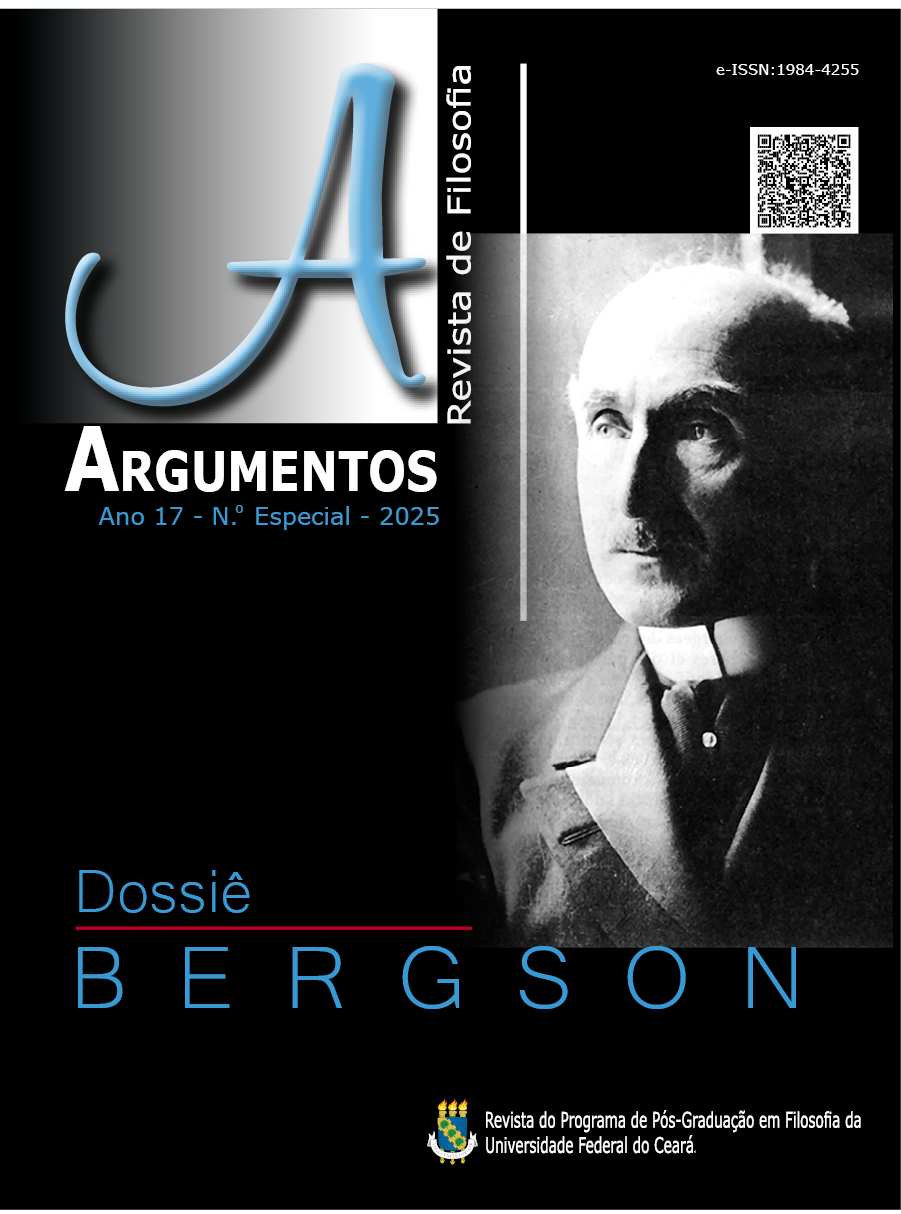Educação, cinema e alteridade: a pedagogia sem imagem
DOI:
https://doi.org/10.36517/arf.v17iespecial.95590Palavras-chave:
Aprendizagem. Bom senso. Cinema. Imagem. Alteridade.Resumo
O objetivo deste artigo é aprofundar algumas linhas de pensamento sugeridas pelas breves e dispersas teses de Bergson sobre a educação, seguindo certas inflexões deleuzianas que se desprendem da crítica à “imagem do pensamento” formulada na conclusão de Proust e os signos (2022), previa à sua sistematização no terceiro capítulo de Diferença e repetição (1988). É verdade que Bergson aparece aqui como um detonador do processo de escrita mais do que como objeto de estudo ou autor principal na abordagem deste artigo. Em um trabalho anterior, justamente, examinamos a noção de aprendizagem, estabelecendo o confronto entre Bergson e Deleuze (Zunino, 2023, p. 195-206). Como resultado desse estudo, notamos que a despeito das aproximações e retomadas deleuzianas do pensamento de Bergson, assumidas como ponto de partida, a aliança entre ambos se desvanece a medida que a filosofia da diferença se afasta de qualquer ato de boa vontade capaz de reviver o bom senso cartesiano ou exaltar o senso comum, como assinalamos inicialmente desde a perspectiva bergsoniana. Para avançar nessa hipótese, propõe-se uma articulação entre aprendizagem e cinema, derivada da pedagogia da imagem esboçada nos estudos deleuzianos: A imagem movimento – Cinema 1(2018a) e A imagem tempo – Cinema 2 (2018b); cujos desdobramentos nos ajudam a compreender aspectos importantes sobre a relação com o outro, com o diferente, abrindo espaço para uma possível prática da alteridade.
Downloads
Referências
ALMEIDA, M. Imagens e sons: a nova cultura oral. São Paulo: Cortez, 2001.
BERGSON, H. A evolução criadora. Trad. Bento Prado Neto. São Paulo: Martins Fontes, 2005.
BERGSON, H. Écrits et paroles I. Mélanges. Édition du Centenaire. Paris: PUF, 1972.
BERGSON, H. Œuvres. Édition du centenaire. Paris: PUF, 1959.
BERGSON, H. La pensée et le mouvant. In: Œuvres. Édition du centenaire. Paris: PUF, 1959.
BERGSON, H. Le bon sens et les études classiques. In: Écrits philosophiques (Le Choc Bergson). Paris: Quadrige; PUF, 2011.
BERGSON, H. L’évolution créatrice. In: Œuvres. Édition du centenaire. Paris: PUF, 1959.
CHATEAU, D. Cine y filosofía. Trad. Silvia Labado. Buenos Aires: Colihue, 2012.
DELEUZE, G. A imagem-movimento: Cinema 1. Trad Stella Senra. São Paulo: Ed. 34, 2018a.
DELEUZE, G. A imagem-tempo: Cinema 2. Trad. Eloisa Ribeiro. São Paulo: Ed. 34, 2018b.
DELEUZE, G. Bergsonismo. Trad. L. Orlandi. São Paulo: Ed. 34, 1999.
DELEUZE, G. Diferença e repetição. Trad. R. Machado e L. Orlandi. Rio de Janeiro: Ed. Graal, 1988.
DELEUZE, G. O que é o ato de criação? In: Dois regimes de loucos. São Paulo: Martins Fontes, 2016.
DELEUZE, G. Pourparlers. Paris: Les Editions de Minuit, 1990.
DELEUZE, G. Proust e os signos. Trad. R. Machado. São Paulo: Ed. 34, 2022.
DELEUZE, G.; GUATTARI, F. O que é a filosofia? Trad. Bento Prado Jr. e Alberto Muñoz. São Paulo: Ed. 34, 2010.
DINIS, N. Educação, cinema e alteridade. Educar, Curitiba, n. 26, 2005, p. 67-79.
Green book. Direção: Peter Farrelly. Produção: Jim Burke et al. Estados Unidos: Universal Pictures, 2018.
GUATTARI, F. “O divã do pobre”. In: METZ, C. et al. Psicanálise e cinema. São Paulo: Global, 1980.
Hiroshima mon amour. Direção: Alain Resnais. Produção: Samy Halfon, Anatole Dauman. Francia; Japón: Argos Films; Como Films; Daiei Studios; Pathé Entertainment, 1959.
LEOPOLDO E SILVA, F. “Reflexão e existência”. Revista Discurso, São Paulo, ano 4, n. 4, 1973, p. 133-145.
Moonlight, Direção: Barry Jenkins. Produção: Adele Romanski, Dede Gardner, Jeremy Kleiner. Estados Unidos: A24; Diamond Films, 2016.
PACHILLA, P. Sentido común y buen sentido en Deleuze. Valenciana, Guanajuato, v. 12, n. 23, 2019, p.139-174.
PROUST, M. À la recherche du temps perdu. IV Vol. Éd. Publié sous la direction de J.-Y. Tadié. Paris: Gallimard; Bibliothèque de la Pléiade, 1987-1989.
ROLNIK, S. Cidadania e alteridade: o psicólogo, o homem da ética e a reinvenção da democracia. In: SPINK, M. (Org.). A cidadania em construção: uma reflexão transdisciplinar. São Paulo: Cortez, 1994. p. 157-176.
SANTOS PINTO, T. O método da intuição em Bergson e a sua dimensão ética e pedagógica. São Paulo: Loyola, 2010.
When they see us. Direção: Ava DuVernay. Produção: Amy J. Kaufman, Ava DuVernay, Oprah Winfrey. Estados Unidos: Participant Media LLC; Harpo Studios; Tribeca Productions; Netflix, 2019.
ZOULIM, C. La notion de bon sens dans la philosophie d’Henri Bergson. Philonsorbonne, Paris, 6, 2012, p. 83-96.
ZUNINO, P. Bergson e Deleuze: por uma estética da aprendizagem. In: FERREIRA, R. et al. (Orgs.). Discussões filosóficas II. Goiânia: Editora Alta Performance, 2023. p. 195-206.
ZUNINO, P. Deleuze: el laberinto de la imagen. Buenos Aires: Teseo, 2020.
Downloads
Publicado
Como Citar
Edição
Seção
Licença
Copyright (c) 2025 Pablo Enrique Abraham Zunino

Este trabalho está licenciado sob uma licença Creative Commons Attribution 4.0 International License.
Autores que publicam nesta revista concordam com os seguintes termos (SOBRE COPYRIGHT E POLÍTICA DE ACESSO LIVRE):
1. Autores mantém OS DIREITOS AUTORAIS concedidos à revista OU Direito de Primeira Publicação, com o trabalho simultaneamente licenciado à Atribuição de Licença Creative Commons (CC BY) que permite o compartilhamento dos trabalhos com reconhecimento de autoria e publicação inicial nesta revista.
2. Autores têm permissão para aceitar contratos, distribuição não-exclusiva da versão do trabalho publicada nesta revista (por exemplo: publicar no repositório institucional ou como um capítulo do livro), com reconhecimento de autoria e publicação inicial nesta revista.
3. Autores têm permissão e são estimulados a publicar e distribuir seu trabalho on-line (por exemplo: em repositórios institucionais ou em sua página pessoal) mesmo durante o processo editorial, haja visto que isso pode aumentar o impacto e citação do trabalho publicado.




.jpg)










._._3.png)
1.jpg)
._._._.png)
